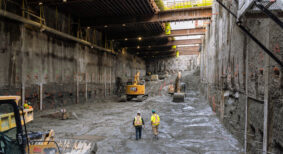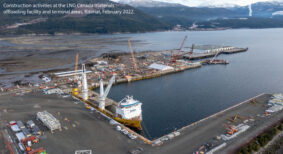Repairing and building gravel roads typically involves removing oversized rocks and burying subgrade problems, such as potholes, under additional gravel. But this “band aid” approach, which does not deal with any underlying problems, is costly. It can require hauling in 200-300 per cent additional material, only to have the problems resurface sometime later.
About 50 per cent of the cost of any gravel road project comes from hauling in material, and then there’s the estimated $10,000 it costs to get a mobile crusher into a local pit. Costs can quickly rise if pit permitting and development is required.
While using a pit crusher makes sense on massive freeway projects and where stringent aggregate specifications for structures, like bridges, are well justified, there are better, more economic options for gravel roads, particularly in remote areas.
Pit mining vs. linear crusher
Instead of burying near-surface subgrade problems under excess gravel from a pit, a growing number of counties, road contractors, as well as timber, oil, or mining companies are discovering that linear crushers can repair a gravel road for significantly less money, while correcting the underlying subgrade problems.
Unlike mobile rock crushers which are stationary when operating, linear crushers move along the road that’s being repaired, crushing oversize rock along it in a crushing chamber. The oversized rock, existing gravel/crushed rock, and natural fines (soils) are all windrowed together and processed through the crusher in one pass, which leaves the reduced material in place as a stable crushed layer. When used in on-road repair, it can help achieve “aggregate lock,” a natural binding of soil and gravel when wet, that can prolong the life of the road surface beyond that of cleaner gravel from a pit that typically lacks soil mixed in as a binding agent.
Better roads for less
Travis Clark, Operations Manager for Roadtech, a contract road construction firm based in St. Maries, Idaho, says the linear crusher has performed well for customers, ranging from logging, oil, and mining companies to county public works departments, that require building or maintaining good gravel roads at lower cost.
Clark relates that for years a timber company in St. Maries, Idaho had been struggling to keep a steep, two-mile stretch of single-lane, gravel road in shape with traditional blading and dust abatement.
“For heavy logging truck use, the consistent 15+ road grade was challenging, the road profile was off, the aggregate was loose, and a big outcrop of rock near the top of the hill required lifting the road profile to go up and over it,” says Clark. “There weren’t enough fines in the road to bind the aggregate together, so dust abatement didn’t work very well.”
The traditional approach to address the challenge would be to haul dirty gravel onto it, but that would have been costly, about $35,000 per mile of lane including dust abatement, according to Clark.
Instead, Roadtech did the rock hammering, proper grader work, then used the linear crusher to break down oversized material and blend in the fines.
“With the linear rock crusher, we were able to get the fines back in so dust abatement would hold in better,” says Clark. “They’ve been running on that road for three years now, and it’s holding up beautiful for them.”
Compared with the cost of hauling in dirty gravel from a pit, at about $35,000 per lane mile including dust abatement, with the linear crusher, Roadtech was able to restore the gravel road for about $18,000 per lane mile, including dust abatement.
“Using the Vanway linear crusher, we saved the timber company about $12,000 per lane mile in gravel road restoration cost, and thousands of dollars each year in road maintenance,” says Clark. “Plus the logging trucks are now able to keep a higher average speed on the road, which has increased work turnaround times on their trucks.”
Del Williams is a technical writer based in Torrance, California. For more info, email getinfo@vanwaycrushers.com; or visit www.vanwaycrushers.com.










I’d say that regardless of the type of road you have, that you should always maintain it. If it is gravel or dirt, then you need to a bit more than asphalt. I really didn’t know that it could be that expensive for something that I thought wasn’t. I am glad that you guys were able to get a deal on the repairs!